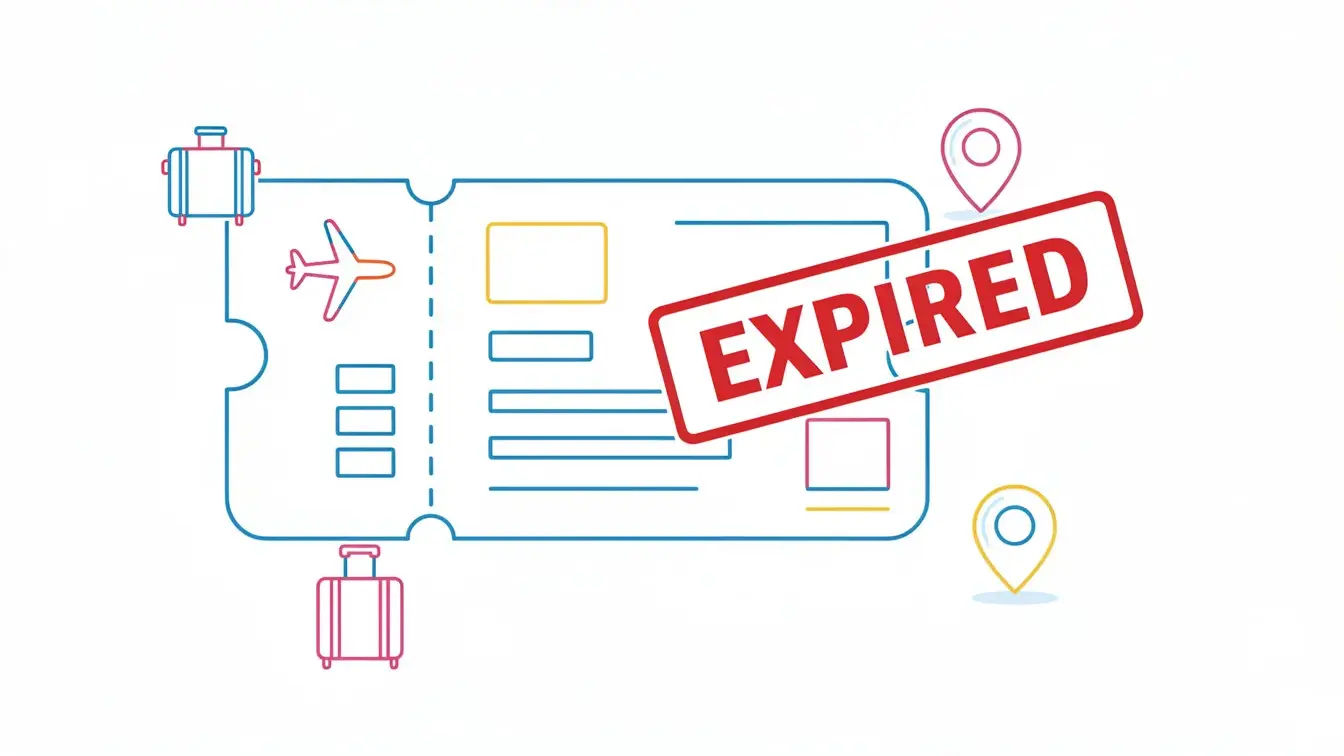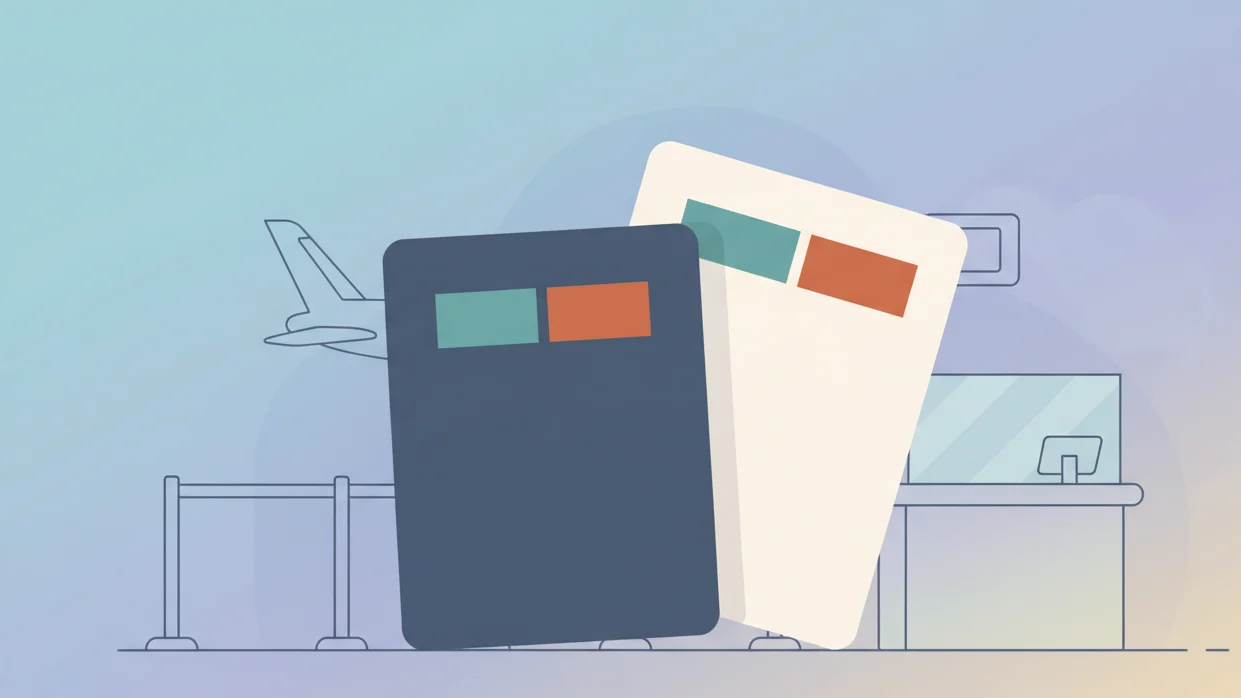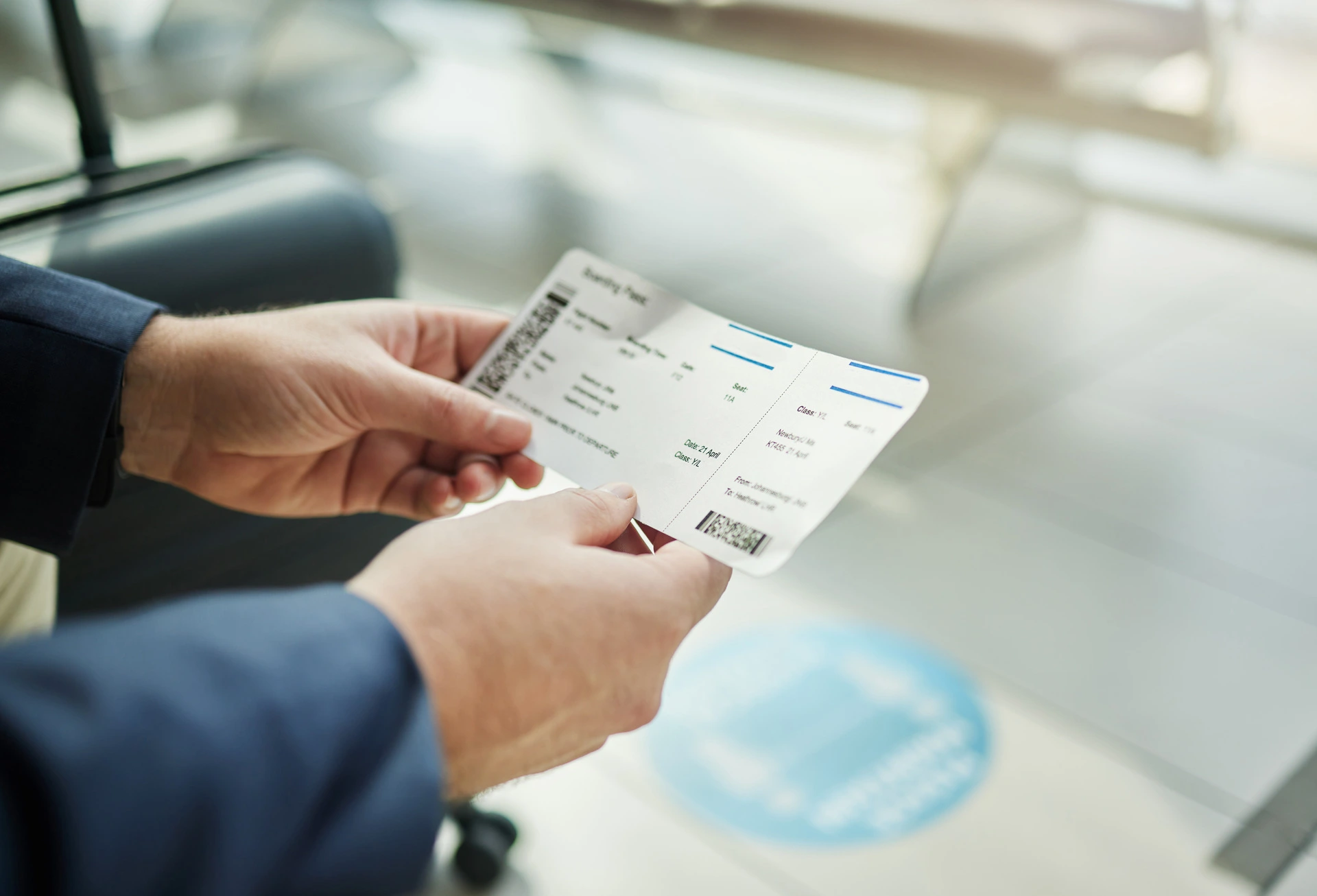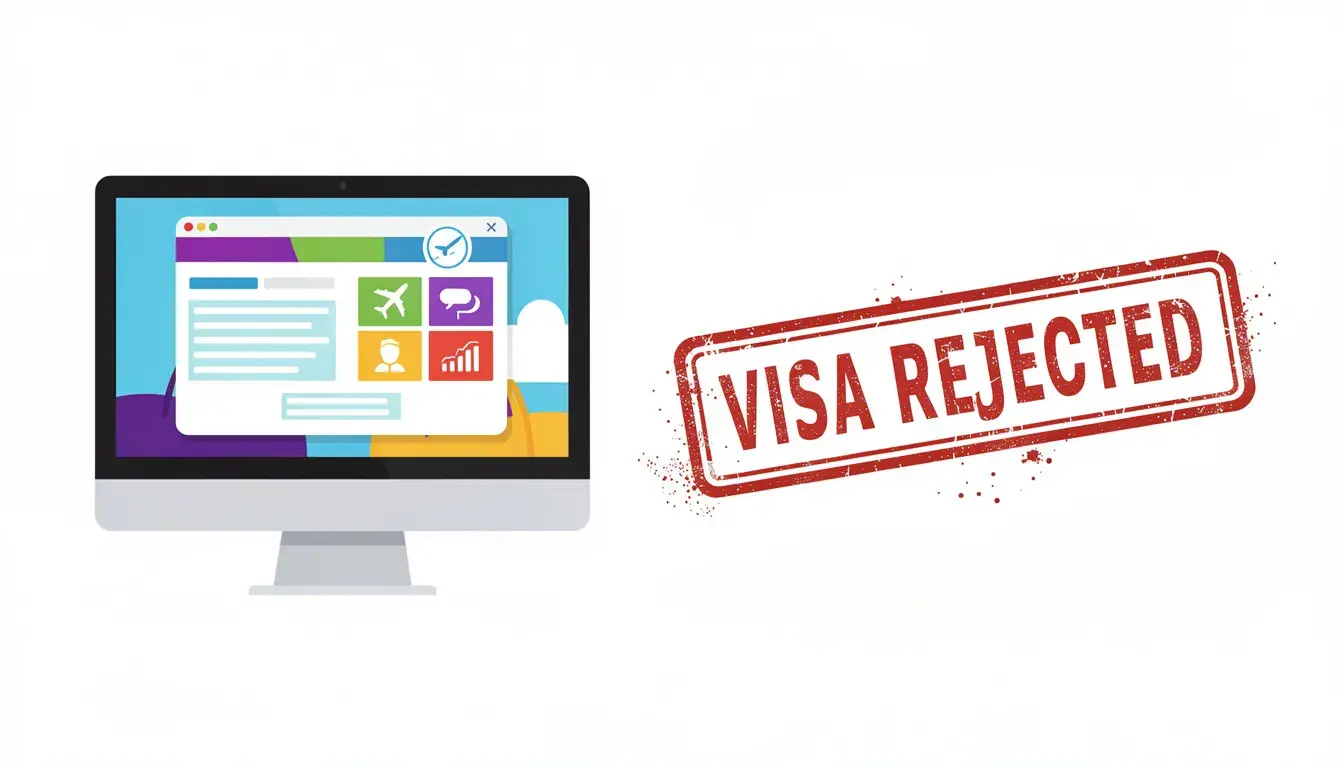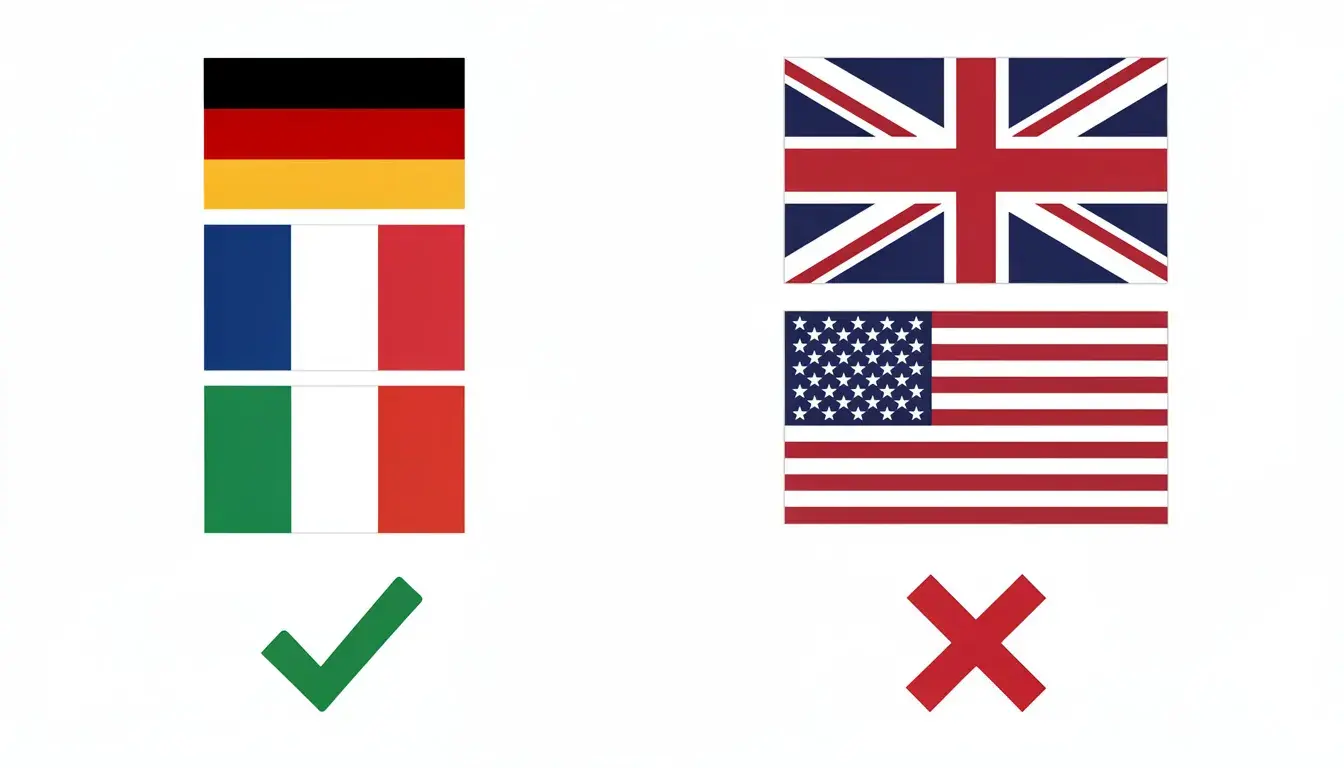Should You Submit Onward Ticket For Spain Visitor Visa?

Do You Really Need an Onward Ticket for a Spain Visitor Visa?
Planning a trip to Spain is exciting, but the moment you start preparing your visa application, questions about onward tickets start piling up. Many travelers from India are unsure whether a confirmed return or onward flight is truly necessary, or if a simple reservation will suffice. The rules are not always spelled out clearly, which leaves room for doubt. Yet understanding what Spanish consulates actually expect can make the process much smoother and prevent unnecessary costs or stress. A dummy ticket can provide the verifiable proof you need without full commitment.
Spain is part of the Schengen zone, and the visa officer’s main concern is that you will follow your stated travel plans and return home on time. A credible itinerary, including flights, hotels, and insurance, helps demonstrate this. In this guide, we will break down the nuances of onward tickets, compare practical approaches, and explore which strategies work best for Indian travelers to strengthen their Spain visa application. For more insights, check our blogs or about us page. Secure your travel plans instantly with a simple dummy ticket booking.
An onward ticket for Spain visa is one of the most essential supporting documents Indian travelers use to show proof of exit plans when applying for a Schengen visa. A verifiable PNR itinerary helps demonstrate clear intent to return, reduces visa delays, and prevents suspicion of overstaying. Spanish consulates often assess the travel route, trip consistency, and ticket validity before granting approval. Using a real flight reservation from dummyflights.com helps avoid costly last-minute bookings, removes guesswork, and increases visa confidence.
Last updated: November 2025 — aligned with current Spain and Schengen visa policy trends.
Do Spanish Consulates Really Expect an Onward Ticket?
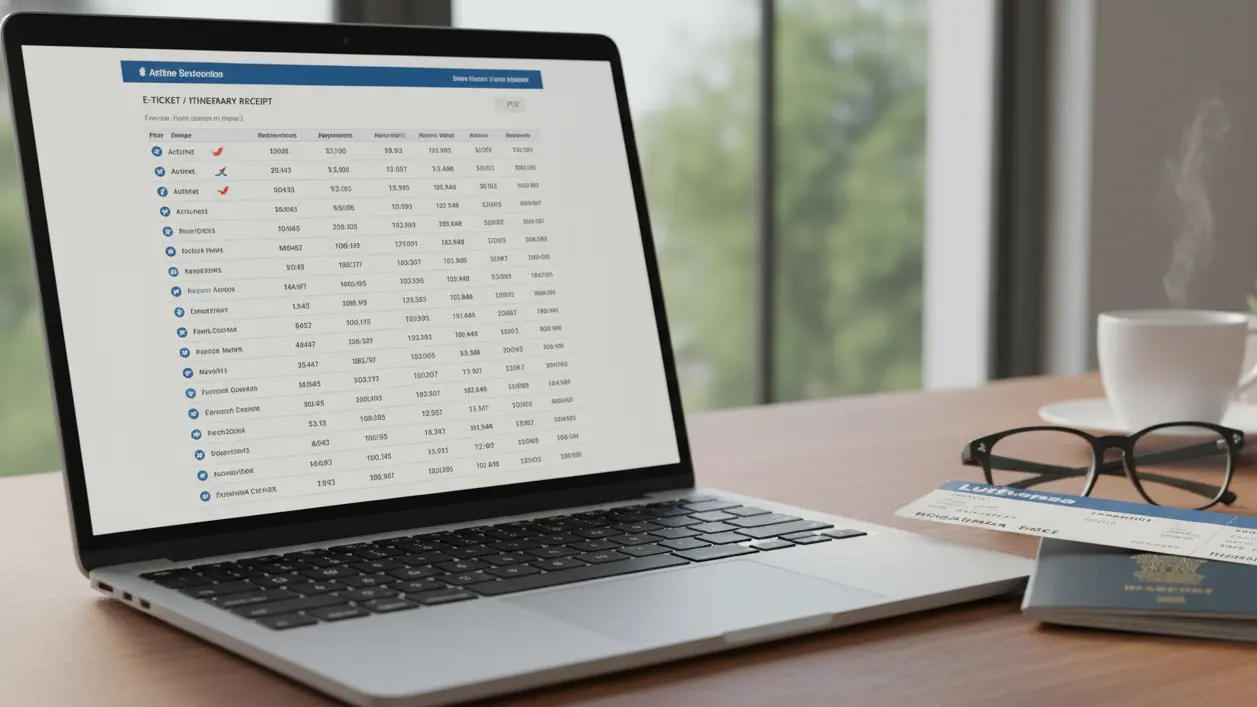
When you start filling out your Spain visitor visa application, the term “onward ticket” tends to pop up everywhere. Some websites say it’s mandatory. Others suggest it’s optional. This conflicting information can make you second-guess your travel plans. Understanding what consulates actually look for will save you confusion, money, and unnecessary stress. For detailed visa tips, visit our FAQ.
Spain is a Schengen country, which means its visa assessment is not done in isolation. The embassy evaluates whether your trip is credible, whether you have strong ties to India, and whether the risk of overstaying is minimal. Your flight reservation plays a part in this evaluation, but it is not the only factor. Knowing how this fits into the bigger picture can help you make smarter choices. Ensure your itinerary looks credible with a reliable dummy ticket booking. Learn more about Schengen rules via Schengen Visa Info.
Why Applicants Get Confused About Onward Tickets
Many Indian travelers assume that a confirmed return flight is an absolute requirement for a Spain visa. This belief often stems from reading generic Schengen visa advice or hearing anecdotal experiences. While consulates do prefer to see that your plans are realistic, there is no hard-and-fast rule that says you must buy a fully paid ticket.
Visa officers are primarily concerned with your intent to leave Spain at the end of your visit. A strong itinerary, consistent travel dates, and proof of accommodation often communicate the same assurance that an onward ticket would. However, a clear flight reservation can act as reinforcement, especially if other parts of your application might leave questions.
The confusion increases because not all consulates interpret the rules the same way. For example, the Madrid consulate may be stricter about verifying return flights, while the Mumbai office may focus more on travel history and proof of funds. This is why understanding the principles behind the requirement is more useful than blindly booking expensive tickets.
Spain’s Place in the Schengen Framework
Spain is part of the Schengen area, which includes 27 European countries that have abolished border checks among themselves. While this makes traveling easier, it also means that entry and exit plans are scrutinized more closely. When a consulate sees an application, it wants to ensure you will enter Spain legally, travel according to your stated itinerary, and exit within the authorized period.
Flight reservations are considered part of the credibility puzzle. They are one piece among hotel confirmations, travel insurance, and supporting documents like bank statements or invitation letters. Your consulate wants to see coherence: the dates on your flight reservation should match hotel bookings and planned activities. If there’s a mismatch, even a paid ticket might raise doubts rather than reassure.
How Consulates Assess Itinerary Credibility
When evaluating your application, visa officers ask themselves several questions:
-
Do the dates make sense? Are you spending a reasonable number of days in Spain?
-
Do your accommodations align with your travel dates?
-
Does your financial situation support your planned trip?
-
Does your travel history indicate that you are likely to return to India?
A flight reservation can help answer the first question quickly. It shows that you have thought about your entry and exit points. For Indian travelers, especially first-time Schengen applicants, this can make a significant difference. Even if a fully paid ticket isn’t strictly required, a verifiable reservation adds weight to your credibility.
Why a Reservation Often Suffices
Many Indian applicants wonder if a simple reservation will be enough, or if they should go ahead and buy a full ticket. In practice, consulates are primarily looking for evidence that your trip is real and well-planned. This means a booking that can be verified, even if it is not yet paid, often fulfills the requirement.
What matters most is that the flight is genuine and checkable. Airline systems allow consulates to verify PNR numbers quickly. This gives the officer confidence that your plans exist and are realistic, without requiring you to commit to expensive, non-refundable tickets in advance.
How Overstay Risk Plays Into the Decision
Visa officers weigh the likelihood that a traveler might overstay in Spain or other Schengen countries. For Indian applicants, the consulate will consider factors like:
-
Previous international travel experience
-
Strong family, employment, or educational ties to India
-
The purpose of the visit and its plausibility
An onward flight doesn’t guarantee approval, but it can reduce perceived risk. If the officer sees a credible return flight that matches your itinerary and accommodation, it signals that your intention is to leave on time. This is especially useful for first-time Schengen applicants, or if your travel plans involve multiple countries.
Indian Traveler Insights
From practical experience, several patterns emerge for Indian applicants:
-
First-time applicants benefit most from showing a verifiable onward ticket, even if it is just a reservation.
-
Applicants with a strong Schengen history may find it optional, as their track record already demonstrates compliance.
-
High-refusal-rate regions: Some Indian cities or regions may see slightly higher scrutiny. Submitting a credible flight reservation can tip the balance in your favor.
-
Multi-country trips: Entering Spain first and planning onward travel within the Schengen area makes a clear flight plan more important.
These insights suggest that a one-size-fits-all approach doesn’t work. Instead, consider your travel history, itinerary complexity, and personal situation when deciding whether to submit an onward ticket.
Practical Takeaways
-
Spain consulates do not explicitly demand a fully paid return ticket for all applicants.
-
A verifiable flight reservation, aligned with your itinerary and hotel bookings, often satisfies the consulate’s requirements.
-
The main purpose of submitting an onward ticket is to demonstrate intent to leave Spain and maintain a coherent travel plan.
-
For first-time Schengen visitors or complex itineraries, submitting a credible reservation can reduce risk and smooth the application process.
Understanding the role of onward tickets is only the first step. Next, it’s important to explore the different approaches to securing these reservations, including fully paid tickets, refundable options, and verifiable reservations that do not require full payment upfront. Knowing the pros and cons of each approach will help you make a practical choice for your situation. To expand your knowledge, explore our blogs for more visa strategies.
Picking the Right Onward Ticket Approach Without Overthinking
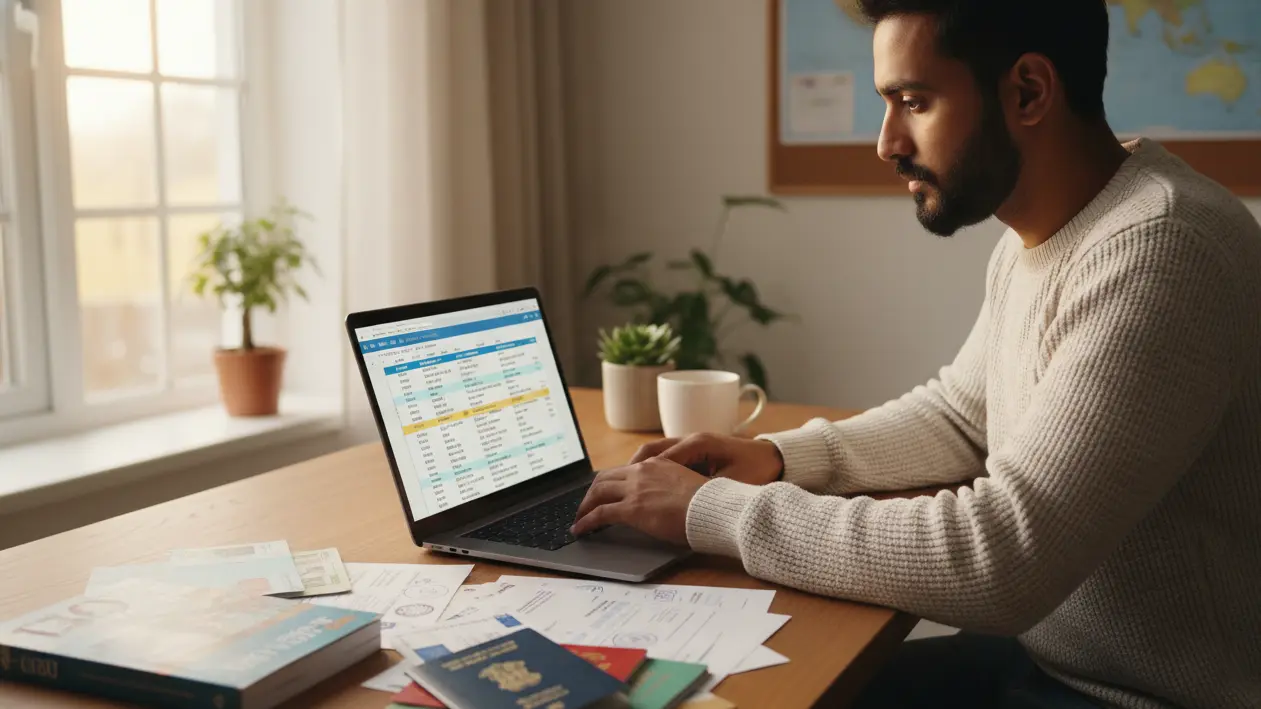
Once you understand that Spain consulates primarily want to see credible plans, the next question is how to provide that proof. Should you buy a fully paid return flight, a refundable ticket, or just get a verifiable reservation? Each approach has pros, cons, and practical considerations, especially for travelers from India. Choosing the right strategy can save money, reduce stress, and improve the odds of visa approval.
Let’s break down the main options, so you can make an informed choice based on your travel style and situation. Save time and stress by choosing to book a dummy ticket.
Fully Paid Return Tickets: The Traditional Approach
For many travelers, buying a return flight upfront seems like the most straightforward solution. A fully paid ticket provides strong evidence that you have committed to a travel plan and intend to leave Spain on the scheduled date.
Benefits
-
High credibility: Visa officers immediately see that your travel dates are fixed.
-
Clear proof of intent to return: Strong signal for first-time applicants.
-
Simplicity: No need to explain reservations or temporary bookings.
Considerations for Indian Travelers
-
Costly upfront: International flights can run high, especially from Indian metros like Mumbai, Delhi, or Bangalore.
-
Inflexibility: Any change in dates or plans can lead to penalties.
-
Risk of cancellations: If visa processing takes longer than expected, you may need to modify the ticket, which can be expensive.
Buying a fully paid ticket works best if your travel dates are definite and you are confident that the visa will be issued on time. For Indian applicants with a fixed itinerary and budget, it’s a solid choice but not always necessary.
Refundable or Flexible Tickets: A Smart Middle Ground
A refundable or flexible ticket can be a good compromise. It provides the credibility of a paid ticket while allowing adjustments if your visa approval is delayed or travel plans change.
Benefits
-
Flexibility: You can adjust travel dates with minimal loss.
-
Visa officer confidence: Shows serious intent without committing fully.
-
Reduced financial risk: Refundable tickets let you recover funds if plans shift.
Practical Tips for India-Based Travelers
-
Check airlines that offer “flexible fares” for international flights from India.
-
Verify refund conditions carefully. Some tickets appear refundable but have hidden fees.
-
Coordinate with hotel bookings and travel insurance to ensure all dates align.
Refundable tickets are especially useful if you are applying from regions with higher scrutiny, or if your Schengen visa appointment is unpredictable.
Airline or Agency-Held Reservations: Credibility Without Full Payment
Some travelers prefer to avoid paying the full fare until the visa is approved. In these cases, airline or agency-held reservations can serve as proof of onward travel. These are temporary bookings that usually include a verifiable PNR and can be confirmed by the consulate.
Advantages
-
Low upfront cost: You don’t need to pay the full fare immediately.
-
Verifiable: Airlines provide a PNR or reservation number that consulates can check.
-
Quick to obtain: Many agencies offer instant reservations, which is useful for last-minute applications.
Considerations
-
Hold times can be limited; you may need to follow up to extend them.
-
Some consulates may prefer longer-standing bookings for high-risk applicants.
-
Alignment with accommodation and insurance is crucial to avoid inconsistencies.
For Indian applicants applying from smaller cities or those on a tight budget, agency-held reservations are a practical way to demonstrate a credible itinerary without overspending.
Pre-Booked Itineraries Without Full Payment: Minimal Investment, Maximum Flexibility
A growing trend among Indian travelers is to submit pre-booked itineraries, which do not require full payment but still provide proof of flights. This can be done through online platforms that issue verifiable reservations, often accepted by consulates.
Why It Works
-
Evidence of planning: Shows that you have a real entry and exit plan.
-
Cost-effective: You avoid paying for tickets that may never be used.
-
Easy to modify: Some services allow unlimited date changes, which is helpful if visa issuance timelines are uncertain.
Key Points to Remember
-
Ensure the reservation is checkable. Consulates can verify the booking using the PNR.
-
Align flight dates with hotel bookings and other supporting documents.
-
Avoid using unverified itineraries, as consulates may reject unverifiable proof.
This approach is particularly appealing to first-time Schengen travelers in India or anyone who wants flexibility without committing to full fares.
Weighing Costs, Credibility, and Risk
When deciding which option to choose, think of three main factors:
1. Financial impact
-
Fully paid tickets are costly but provide maximum credibility.
-
Refundable tickets reduce risk but may still be expensive.
-
Agency-held or verifiable reservations are low-cost solutions.
2. Visa credibility
-
Fully paid tickets signal seriousness and reduce doubt.
-
Pre-booked or verifiable reservations offer sufficient proof if properly aligned with other documents.
3. Practical risk management
-
Mismatched dates, cancellations, or delays can undermine credibility.
-
Flexibility is essential, especially when visa issuance timing is unpredictable.
For Indian travelers, the sweet spot often lies in verifiable reservations with flexible options. You get credible proof for the consulate, save money, and retain the ability to adjust travel dates if needed.
When a Verifiable Reservation Makes Sense
Using a verifiable flight reservation can be a smart choice in several scenarios:
-
You are a first-time Schengen applicant and want to strengthen your application.
-
Your itinerary involves multiple Schengen countries with Spain as the entry point.
-
You want to minimize upfront costs but still provide credible proof.
-
Visa appointments are scheduled weeks in advance, and you do not want to risk buying tickets too early.
Platforms like dummyflights.com offer instantly verifiable reservations with a real PNR. For just $15 (≈₹1,300), you can receive a PDF that is immediately ready for submission. This provides peace of mind and allows you to focus on other parts of your application.
Indian Applicant Perspective
Travelers from India often face high costs and fluctuating flight availability. Considering that:
-
Budget-conscious travelers can rely on agency-held or verifiable reservations without breaking the bank.
-
Applicants from high-refusal regions may benefit from refundable or fully paid tickets to reinforce credibility.
-
First-time applicants gain confidence by submitting verifiable reservations along with coherent hotel and insurance documents.
Matching your ticket approach to your situation is more effective than simply following generic advice. It is about optimizing credibility, cost, and flexibility together.
Choosing the Right Approach
Selecting the right onward ticket strategy is not about blindly paying for the most expensive option. It is about demonstrating a clear, verifiable travel plan that aligns with your visa application.
-
Fully paid tickets work best if travel dates are fixed and budgets allow.
-
Refundable tickets provide credibility with added flexibility.
-
Agency-held or pre-booked verifiable reservations strike a balance for cost-conscious travelers.
For most Indian applicants, a verifiable reservation—aligned with hotels and travel insurance—offers the ideal combination of credibility, flexibility, and affordability. This sets the stage for smoother visa processing without unnecessary financial burden.
👉 Order your dummy ticket today to streamline your process.
Which Travelers Really Need an Onward Ticket? Breaking It Down
By now, you understand that the Spanish consulate wants to see a credible travel plan, and there are several ways to demonstrate it. But not every traveler is in the same situation. Whether you need a fully paid ticket, a flexible booking, or a verifiable reservation depends heavily on your travel history, itinerary, and personal circumstances. This becomes particularly relevant when applying for a Spain visitor visa, Spain tourist visa, or a Spain Schengen visa through a visa application centre.
Let’s explore different traveler scenarios and determine who should submit an onward ticket and who can safely skip it. Make visa submissions easier—just book a dummy ticket.
First-Time Schengen Applicants: Playing It Safe
If this is your first time applying for a Schengen visa or a Spain Schengen visa application, the consular officer will examine your documents more closely. Without a prior record of international travel, your intent to return home can appear uncertain.
Why an onward ticket helps
-
It immediately shows that you have planned your exit from Spain and other Schengen countries.
-
Paired with hotel reservations, travel insurance, and proof of financial means, it strengthens your credibility.
-
Makes it easier for the Spanish embassy to process your Spain visa application confidently.
Practical tip for Indian travelers
Even a verifiable flight reservation works well. You don’t need to pay for a full ticket upfront, but the visa application centre must be able to check the booking. This is particularly useful if your itinerary involves multiple Schengen countries or if your visa appointment date is weeks away.
Applicants With Previous Schengen History: Optional But Helpful
If you’ve traveled to Schengen countries before and complied with all visa rules, you already have a track record of leaving on time. This works in your favor when applying for a tourist visa application or Spain tourist visa.
When an onward ticket is optional
-
Your travel history speaks for itself.
-
Visa officers can quickly see that you are a low-risk traveler, especially if your signed visa application form, hotel reservations, and required documents are in order.
When it may still help
-
If your current itinerary is more complex than past trips.
-
If your application includes visits to other Schengen countries or irregular travel dates.
For Indian travelers who have previously visited Europe, a verifiable reservation can be a reassurance rather than a strict necessity. It adds confidence without adding unnecessary cost.
Applicants From High-Refusal-Rate Regions: Extra Assurance
Certain regions in India experience higher scrutiny when applying for a Spain visa or Spain tourist visa. Applicants from these areas may benefit from additional steps to strengthen their case.
Why onward tickets matter here
-
They reduce doubt about whether you will enter Spain and return to India.
-
Paired with other required documents, such as proof of employment, residence permit, or family ties, they minimize insufficient funds concerns.
Practical advice
-
Opt for verifiable reservations that can be checked instantly.
-
Ensure your travel dates align with hotel reservations and travel medical insurance.
-
Avoid changing your itinerary after submission unless necessary.
Even a low-cost verifiable flight reservation can show that your plans are realistic and well organized, especially for first-time applicants submitting a student visa or short stay visa.
Multi-Country Schengen Trips Entering Through Spain
If Spain is just the first stop in a multi-country Schengen trip, onward tickets become more nuanced. The Spanish consulate will want to ensure that your entry and exit points match your stated itinerary.
Key considerations for Indian travelers
-
Entry through Spain with exit from other Schengen countries is common, but the itinerary must be logical for your visit Spain plan.
-
Internal travel should align with flights, trains, or buses, hotel bookings, and your application form.
-
Any mismatch between flights and accommodations can trigger doubt during Spain visa processing time.
Submitting a verifiable onward ticket showing entry into Spain and exit from another Schengen country can clarify your plans and prevent unnecessary questions. It doesn’t need to be fully paid, but the PNR must be checkable.
Students and Short-Term Visitors
Travelers coming for student visas, short-term courses, or family visits often fall into a special category. The Spanish embassy wants to ensure these travelers leave at the end of their program or maximum stay permitted on a short stay visa.
Why onward tickets help
-
They provide tangible proof that you plan to return.
-
They complement official documents like invitation letters, university admission letters, and other required documents.
For Indian applicants, a verifiable reservation is often sufficient, especially when combined with travel insurance and proof of financial means.
Business or Frequent Travelers
If you travel frequently for business or personal reasons, consulates usually trust your track record. In this case, an onward ticket is often optional.
When it may still help
-
When planning a complex itinerary with multiple destinations.
-
If your stay in Spain is longer than usual for short-term visits.
-
During peak seasons or unusual flight schedules.
For Indian business travelers, a flexible or verifiable flight reservation can satisfy the consular officer without buying a full ticket unnecessarily.
Practical Scenarios for Indian Travelers
Here’s a snapshot to make it concrete:
-
Scenario 1: First-time traveler from Delhi visiting Madrid and Barcelona for a week. Best option: verifiable reservation showing entry and exit.
-
Scenario 2: Indian applicant with prior Schengen visits planning a two-week Spain-Italy trip. Best option: flexible or refundable ticket, optional but recommended.
-
Scenario 3: Traveler from a high-refusal city in India attending a family wedding in Spain. Best option: verifiable reservation with hotel bookings and travel insurance confirmation.
-
Scenario 4: Frequent business traveler with multi-country itinerary. Best option: agency-held or flexible ticket, optional but convenient.
These examples illustrate that your situation determines whether submitting an onward ticket is necessary or simply a confidence booster for a Spain visitor visa or Schengen visa.
Key Takeaways
-
First-time applicants: Strongly recommended to submit a verifiable reservation.
-
Applicants with a travel history: Optional, unless itinerary is complex.
-
High-refusal-rate regions: Recommended as a risk mitigation measure.
-
Multi-country itineraries: Helpful to avoid confusion and ensure consistency.
-
Students or short-term visitors: Reservation complements official documentation.
-
Frequent travelers: Optional, but flexible bookings are convenient.
Using Verifiable Flight Reservations
For Indian travelers who want credibility without committing to full fares, services like dummyflights.com provide instant, verifiable reservations. For $15 (≈₹1,300), you receive a PDF with a real PNR that the Spanish embassy or visa application centre can check. This gives reliable proof for your Spain visa processing time while maintaining flexibility, making it ideal for first-time visitors, multi-country trips, or applicants from high-scrutiny regions.
Understanding your traveler profile is critical. Once you know where you fit, it becomes easier to decide which onward ticket approach makes sense. The next step is to ensure your flight reservations align seamlessly with your supporting required documents, including hotel reservations, invitation letters, and travel insurance. This alignment can make or break your application, regardless of whether you buy a fully paid ticket or submit a simple verifiable reservation.
Making All Your Travel Documents Work Together Seamlessly
Having an onward ticket is only part of the equation. Visa officers look at your application as a whole. Flights, hotels, travel insurance, and invitation letters need to tell a cohesive story. Even the most credible flight reservation can raise questions if your supporting documents do not align. For Indian travelers, small inconsistencies are often what lead to doubts or delays.
It’s not about perfection—it’s about coherence and clarity. Let’s break down how to ensure your onward ticket and supporting documents work together, so your application stands out in the right way. Avoid paying full airfare upfront by opting for a verified dummy ticket booking.
Synchronizing Flight Dates With Hotel Bookings
One of the most common mistakes applicants make is mismatched dates. For example, your flight may show entry on June 10, but your hotel bookings start on June 12. Even if this seems minor to you, consulates notice.
Tips for Indian travelers:
-
Ensure check-in and check-out dates match your flights.
-
For multi-city trips, maintain a consistent flow—Madrid first, then Barcelona, for instance.
-
Include hotels for all nights of your stay. Missing accommodation for even one night can raise questions.
When using verifiable flight reservations, you can adjust your flight dates to match hotel bookings. Platforms like dummyflights.com allow unlimited date changes, so you can coordinate dates without purchasing a new ticket.
Coordinating With Invitation Letters and Travel Insurance
Flights and hotels are only one side of the story. Invitation letters and travel insurance complete your credibility picture.
Invitation letters:
-
If visiting family or friends, make sure the dates in the letter match your flights.
-
Include details like the host’s address, contact information, and relationship to you.
Travel insurance:
-
Coverage should span the full duration of your trip, including entry and exit dates.
-
Some consulates check the validity of insurance dates alongside your flight itinerary.
A mismatch between any of these elements can trigger doubt, even if you have a perfectly verifiable onward ticket. Always cross-check before submission.
Common Mistakes That Raise Red Flags
Indian applicants often make the same errors when aligning travel documents:
-
Date inconsistencies: Flights, hotels, or insurance dates don’t match.
-
Partial bookings: Only a portion of your stay is booked, leaving gaps in accommodation.
-
Unverifiable flights: Tickets without a real PNR that the consulate can check.
-
Over-ambitious itineraries: Visiting multiple cities without feasible travel time.
-
Document conflicts: Invitation letters or employment proof that don’t match travel plans.
Avoiding these mistakes is as important as the type of onward ticket you submit. A simple, verifiable reservation combined with aligned supporting documents is often all you need.
How to Align Documents Efficiently
Here’s a practical approach Indian travelers can use:
-
Start with your flight reservation: Decide whether you are using a fully paid ticket, a refundable ticket, or a verifiable reservation.
-
Match hotel bookings to flights: Every night you plan to stay should be booked and verifiable.
-
Check your invitation letters or other supporting documents: Dates, addresses, and purpose of visit should all match your itinerary.
-
Verify travel insurance coverage: Ensure it spans the entire stay, including entry and exit dates.
-
Double-check consistency: Look at your application as a whole to ensure there are no gaps or contradictions.
This step-by-step alignment makes your application coherent and reduces the likelihood of questions or delays at the consulate.
Why Verifiable Flight Reservations Are Ideal
For many Indian travelers, fully paid tickets are expensive and inflexible. Refundable tickets may also come with hidden fees. This is where verifiable flight reservations shine.
Benefits of using a verifiable reservation:
-
Checkable PNR: Consulates can confirm your booking instantly.
-
Cost-effective: Only $15 (≈₹1,300) for a reservation, much cheaper than a full ticket.
-
Flexible: Dates can often be changed without additional charges.
Using such reservations allows you to align flights with hotels, insurance, and invitation letters without locking in a large expense. It’s particularly helpful for first-time applicants or those planning multi-city trips.
Coordinating Multi-City Itineraries
If your Spain trip involves multiple cities, the importance of document alignment increases. Visa officers want to see a realistic, chronological plan.
Practical advice for Indian travelers:
-
Sequence flights logically: Madrid → Barcelona → Valencia, for instance.
-
Ensure hotel bookings reflect the time spent in each city.
-
Travel insurance should cover the entire duration, even if you move between cities.
-
Optional: Internal transportation tickets can further reinforce credibility.
A verifiable onward reservation can be structured to reflect entry and exit from Spain while keeping internal travel flexible. This allows you to maintain coherence across all documents.
Checking Consistency Before Submission
Before submitting your application:
-
Review every date in flights, hotels, and insurance.
-
Compare all supporting documents with your itinerary.
-
Ensure your invitation letters match your stated purpose and schedule.
-
Confirm that any verifiable reservations are still valid and checkable.
Taking the time to cross-check can prevent delays or unnecessary follow-ups from the consulate. Indian applicants often underestimate how small inconsistencies can affect credibility.
Practical Scenario: Coordinated Documents for a First-Time Traveler
Consider an Indian applicant traveling to Spain for the first time for a 10-day vacation:
-
Flight: Verifiable reservation showing arrival in Madrid on June 10 and departure from Madrid on June 20.
-
Hotels: Bookings in Madrid, Barcelona, and Valencia, covering all nights.
-
Invitation letter: Friend in Barcelona confirms dates of stay and address.
-
Travel insurance: Coverage from June 10 to June 20.
When all documents align, the visa officer sees a coherent story. The reservation need not be fully paid to be credible. Verifiability and consistency are what matter most.
Key Takeaways for This Section
-
Your onward ticket is only part of the credibility puzzle; supporting documents matter equally.
-
Align flights, hotels, invitation letters, and travel insurance to present a clear, cohesive itinerary.
-
Avoid mismatches, gaps, or unverifiable bookings—they create doubt.
-
Verifiable flight reservations help you coordinate all documents efficiently, cost-effectively, and flexibly.
Once your documents are aligned, you can focus on practical booking and submission strategies. The next step is understanding when to book flights, how to handle changes, and which approaches work best for Indian travelers seeking Spain visas. With your itinerary and supporting documents coordinated, this process becomes far smoother and less stressful.
How to Book or Submit an Onward Ticket for a Spain Visitor Visa Without Stress
Now that you understand the importance of an onward ticket for a Spain visitor visa, the next step is knowing how to secure it efficiently. Many Indian travelers overthink this process, worrying about cost or rigid schedules. The reality is, you don’t need to pay full airfare or lock yourself into fixed dates to satisfy the Spain tourist visa requirements. What matters most is credibility, alignment with your documents, and flexibility.
Let’s explore practical ways to book, submit, and manage an onward ticket for a Spain Schengen visa, while keeping your travel plans stress-free and fully compliant. Keep your travel plans flexible and verifiable when you book a dummy ticket.
When You Haven’t Booked Flights Yet for a Spain Tourist Visa
If your Spain visa application is coming up and your flights aren’t confirmed, there’s no need to panic. The Spanish consulate recognizes that visa applicants often wait for appointment confirmation or visa approval before committing to expensive tickets.
Options for Indian travelers:
-
Verifiable flight reservations: Instant bookings with real PNRs that the visa application centre can check. These reservations can be modified if your Spain visa processing time is extended.
-
Agency-held or airline-held reservations: Temporary bookings accepted by consular officers as proof of a realistic itinerary.
-
Flexible or refundable tickets: Can be purchased and modified with minimal financial loss if visa dates change.
The key is that the consulate can verify the booking and see a consistent plan for entry and exit from Schengen countries. Paying full fare is rarely required for a tourist visa, student visa, or short-term Spain visa.
Timing Your Flight Reservation for a Spain Schengen Visa
Booking too early or too late can create challenges. Timing is crucial when preparing a Spain Schengen visa application.
-
Too early: If your visa takes longer than expected, changing tickets can be costly.
-
Too late: Waiting until the last minute limits options for verifiable reservations and preferred flight times.
A practical approach is to book a verifiable reservation 2–4 weeks before your visa appointment, ensuring your itinerary is current, checkable, and aligned with hotel reservations and other required documents.
Flexible Dates and Changes for Spain Tourist Visa Applications
Visa processing can be unpredictable. Your onward ticket should allow date flexibility so that your Spain tourist visa application remains credible.
Tips for Indian applicants:
-
Opt for reservations that allow unlimited or low-cost date changes.
-
Align flight dates with hotel reservations, invitation letters, travel insurance, and the application form submitted to the Spanish consulate.
-
Avoid non-refundable, rigid tickets booked too early; these can cause stress if Spain visa processing time is extended.
Verifiable flight reservation services, such as dummyflights.com, are especially useful here. They provide flexibility and allow adjustments without extra charges, making them ideal for first-time Schengen visa applicants or multi-country trips.
Cost-Saving Tips for Indian Travelers Applying for a Spain Visa
A fully paid international ticket can be expensive, particularly for Indian travelers. Fortunately, there are ways to save money without compromising credibility:
-
Use verifiable reservations instead of fully paid tickets. At around $15 (≈₹1,300), these are far cheaper than purchasing full airfare for a Spain visitor visa.
-
Avoid unnecessary premium fares. The Spanish consulate only needs proof of travel, not luxury seating.
-
Combine refundable tickets with a verifiable reservation if your Spain tourist visa requirements include uncertain travel dates.
These strategies allow you to meet the Spain Schengen visa requirements while keeping costs manageable.
How to Submit Your Onward Ticket for a Spain Schengen Visa
Submitting your reservation correctly is critical. The Spanish embassy or visa application centre will check it alongside hotel reservations, the application form, and other required documents.
Best practices:
-
Include a PDF of your verifiable reservation with PNR, entry and exit dates, and passenger details.
-
Ensure your flight dates match your application form and planned itinerary in other Schengen countries.
-
Verify that supporting hotel reservations, invitation letters, and travel insurance are aligned with your ticket.
Even small discrepancies can trigger additional scrutiny. Consistency is just as important as the ticket itself.
Handling Changes After Submission of a Spain Tourist Visa Application
Plans sometimes shift after submission. Flight dates, hotel reservations, or internal travel may need adjustments. Proper handling is essential.
Tips for Indian applicants:
-
Notify the Spanish consulate if major itinerary changes occur. Minor changes may not require reporting.
-
Keep your verifiable reservation flexible. Services allowing date changes without fees make life easier.
-
Avoid last-minute cancellations or unverifiable bookings, as these can undermine credibility.
Starting with a flexible reservation reduces stress and avoids unnecessary costs if your Spain visa processing time extends.
Aligning Onward Tickets With Multi-City or Multi-Country Trips
If your trip includes multiple cities in Spain or entry through Spain with exit from other Schengen countries, coordination is crucial.
Practical steps:
-
Clearly indicate entry and exit points on your application form.
-
Ensure internal flights, trains, or buses align with hotel reservations.
-
Confirm that travel insurance covers your entire trip, including internal travel across Schengen countries.
A verifiable flight reservation can show entry and exit points while leaving internal travel flexible. This ensures the Spanish consulate sees a realistic plan without requiring multiple expensive tickets.
Common Mistakes Indian Travelers Make With Spain Visa Onward Tickets
Even experienced applicants can make errors that complicate submission:
-
Unverifiable itineraries: If the consulate cannot check your PNR, the ticket has little weight.
-
Mismatched dates: Flight dates not matching hotel reservations or required documents raise red flags.
-
Rigid bookings too early: Changes may be costly if Spain visa processing time is longer than expected.
-
Overcomplicated itineraries: Too many cities or unrealistic schedules can confuse the consular officer.
Avoiding these pitfalls keeps the submission process smooth and increases your chances of approval.
Why Verifiable Flight Reservations Are Ideal for Spain Tourist Visa Applicants
Verifiable reservations offer the right balance of cost, credibility, and flexibility for Indian travelers:
-
Instant verification: The Spanish consulate can check your PNR immediately.
-
Affordable: Around $15 (≈₹1,300), far less than purchasing full tickets.
-
Flexible: Dates can be adjusted without extra charges.
-
Aligned with supporting documents: Helps maintain consistency across your Spain visa application.
This solution is particularly useful for first-time applicants, multi-country trips, or applicants from high-scrutiny regions. It proves seriousness without financial burden.
Key Takeaways for Booking Onward Tickets for a Spain Visa
-
Focus on credibility and alignment rather than full payment.
-
Timing, flexibility, and verifiability are crucial for a Spain Schengen visa or Spain tourist visa.
-
Align flights with hotel reservations, invitation letters, and required documents.
-
Consider verifiable reservations to save money, maintain flexibility, and provide instant proof.
-
Multi-city or multi-country trips require careful coordination, but flexible reservations make it manageable.
Once your flight reservation is booked and submitted correctly, your Spain visa application is nearly complete. Understanding the pros and cons of submitting an onward ticket helps you decide when it’s essential, optional, or unnecessary. With proper planning, every Indian applicant can approach Spain visitor visas, tourist visas, and student visas strategically and confidently.
Evaluating the Risks and Benefits of Submitting an Onward Ticket
After exploring how to secure and align an onward ticket, the next question is more strategic: should you submit it at all? For Indian travelers, this decision depends on your profile, itinerary, and visa history. Submitting an onward ticket can boost credibility, but it also comes with costs, commitments, and potential pitfalls. Understanding the risks and benefits helps you make an informed choice rather than acting on assumptions.
The Benefits of Submitting an Onward Ticket
1. Demonstrates Clear Intent to Return
Visa officers want to be confident that you will leave Spain at the end of your trip. An onward ticket shows exactly that: entry and exit dates are planned and verifiable.
-
Particularly useful for first-time Schengen applicants.
-
Adds weight to your application if other documents, like proof of employment or family ties, are limited.
-
Reduces the perceived risk of overstaying.
For Indian travelers, this reassurance can make the difference between a smooth approval and additional scrutiny.
2. Strengthens the Credibility of Your Itinerary
Flights aligned with hotels, invitation letters, and travel insurance show a cohesive travel story. A consulate sees that you’ve thought through logistics, rather than submitting fragmented documents.
-
A verifiable flight reservation, even if not fully paid, can be sufficient.
-
Helps multi-city or multi-country travelers avoid confusion.
3. Reduces Anxiety During the Visa Process
Having a clear, checkable flight plan can reduce stress, especially for first-time Indian applicants. You don’t have to wonder whether the consulate will question your travel dates or itinerary.
4. Provides a Practical Safety Net
In case of minor visa delays, refundable or flexible reservations allow you to adjust dates without major losses. Even a low-cost verifiable reservation can serve this purpose.
The Risks of Submitting an Onward Ticket
While there are clear advantages, submitting an onward ticket is not without potential downsides:
1. Financial Commitment
Fully paid tickets can be expensive, especially from India to Spain. Paying too early may tie up money unnecessarily, particularly if visa approval is delayed or refused.
2. Inflexibility
Rigid tickets leave little room for changes. If your travel dates shift, you may face penalties or need to purchase a new ticket entirely.
3. Misaligned Documents Can Backfire
A paid ticket that doesn’t match hotel bookings, invitation letters, or insurance can raise suspicion rather than provide reassurance. Consulates are looking for coherence.
4. Unnecessary Pressure for Some Travelers
Applicants with strong Schengen history or simple itineraries may not need an onward ticket. Submitting one in these cases could create extra stress or expenses without adding real value.
When Submitting an Onward Ticket Is Strongly Recommended
For Indian travelers, certain scenarios make submitting an onward ticket highly advisable:
-
First-time Schengen applicants: Your credibility is not yet established.
-
High-risk regions: Applicants from cities with higher refusal rates can reduce doubt.
-
Complex or multi-country itineraries: Clear entry and exit plans simplify evaluation.
-
Short-term study or family visits: Supports official documents like invitation letters or university acceptance letters.
In these cases, a verifiable reservation is often sufficient. It demonstrates serious intent without the need for costly fully paid tickets.
When an Onward Ticket Is Optional
Some travelers can safely skip submitting an onward ticket:
-
Applicants with prior Schengen visas: History of compliance reduces the perceived risk.
-
Simple itineraries with strong supporting documents: A 5-day trip to Spain with hotel bookings, travel insurance, and proof of funds may be enough.
-
Frequent business travelers: Established travel history signals low overstay risk.
Even here, submitting a verifiable reservation can provide peace of mind, but is not strictly necessary.
When It Might Be Unnecessary
There are scenarios where an onward ticket may not add value:
-
Short visits where your purpose and return plans are clear and supported by documents.
-
Applicants with extensive travel history outside Schengen, showing consistent returns to India.
-
Situations where cost and timing make purchasing a ticket impractical, and verifiable alternatives are available.
In such cases, consulates focus more on the overall credibility of your application rather than the ticket itself.
Balancing Cost, Credibility, and Flexibility
Indian travelers often worry about costs and over-commitment. The trick is to balance three factors:
-
Cost: Avoid paying full airfare unnecessarily. Verifiable flight reservations cost a fraction of actual tickets.
-
Credibility: Ensure dates align with hotels, invitation letters, and travel insurance. A checkable PNR carries credibility.
-
Flexibility: Opt for refundable, flexible, or verifiable options to accommodate visa delays or itinerary changes.
A verifiable flight reservation often achieves all three: low cost, credible proof, and adjustable dates.
Practical Scenario: First-Time Indian Traveler
Imagine a first-time applicant from Bangalore planning a 10-day trip:
-
Without an onward ticket: Visa officer may request additional proof or scrutinize the itinerary.
-
With a fully paid ticket: Strong credibility but high upfront cost and risk if dates change.
-
With verifiable reservation: Low cost, checkable by the consulate, and easily aligned with hotels and insurance.
In this case, the verifiable reservation provides the optimal balance.
Practical Scenario: Experienced Traveler
Consider an Indian applicant with multiple past Schengen visits, planning a 7-day trip to Spain:
-
History shows compliance with visa rules.
-
Simple itinerary with hotel bookings and travel insurance.
For this traveler, submitting an onward ticket is optional. A verifiable reservation could still be submitted for peace of mind but is not strictly necessary.
How to Make the Decision
Ask yourself:
-
Am I a first-time Schengen traveler or from a high-refusal region?
-
Is my itinerary complex or multi-country?
-
Do I have strong supporting documents already?
-
How much flexibility do I need for my travel dates?
-
What is my budget for flights?
Answering these questions helps you decide whether to submit a ticket, which type to choose, and how to align it with your supporting documents.
Key Takeaways
-
Submitting an onward ticket is a tool to enhance credibility, not a requirement in every case.
-
The benefits include demonstrating intent to return, strengthening your itinerary, and reducing stress.
-
Risks include financial cost, inflexibility, and misaligned documents.
-
Indian travelers benefit most when using verifiable flight reservations that are low-cost, checkable, and flexible.
-
Strong travel history or simple itineraries may make an onward ticket optional.
Understanding the risks and benefits allows you to approach your Spain visa application strategically.
Onward Tickets At The Airport And Spanish Border: What Actually Happens
You have your visa appointment planned, your documents lined up, and now you are wondering what will actually happen on travel day. Who will ask about your onward ticket, what will they look for, and when can it become a problem.
Let’s walk through it step by step, from the check-in desk in India to the immigration counter in Spain, so you know exactly what to expect and how to avoid awkward surprises.
How Airline Staff Really Look At Your Ticket
Before you ever speak to Spanish immigration, your airline has the first say. They are the ones who can stop you from boarding if they are not convinced you will be allowed into Spain or the Schengen area.
Airlines are practical. They care about:
-
Whether you have a valid visa for Spain or Schengen area
-
Whether your passport is valid for long enough
-
Whether you look like you will be admitted at the other end
If you are flying on a one-way ticket with a short-stay visa, that is where questions start. The staff at the counter knows that if Spain refuses your entry, the airline pays to fly you back. So they often act more cautiously than the consulate.
They might ask:
-
When are you coming back to India
-
Where are you going after Spain
-
Whether you have a return ticket or onward booking
If you can calmly show a printed or PDF reservation that matches your visa dates, check in usually becomes routine again.
When Indian Airports Start Asking Tougher Questions
Most of the time, check-in is quick and friendly. Still, some situations almost always trigger extra checks, especially for Indian travelers heading to Europe.
You are more likely to be asked about your onward ticket if:
-
You hold a short-stay Schengen visa, but only have a one-way ticket
-
You are a first-time traveler with no international stamps
-
You are a student travelling alone during vacation periods
-
You are a digital nomad with loose plans and no fixed office or employer
-
You are visiting family for a long stay, close to 90 days
Staff are not trying to trap you. They just need to see that your story matches your documents.
For example:
-
A student flying to Madrid for a 20 day trip during semester break should have a clear return booking within that period.
-
A family visitor going to attend a wedding in Barcelona should have an exit plan around the same time the event ends.
-
A digital nomad who plans to travel around Europe for 80 days should be ready to show an onward ticket out of the Schengen zone.
If your reservation supports your explanation, you are usually checked in without any drama.
What Really Happens At Spanish Immigration
Once you land in Spain, the game shifts from airline rules to border control rules. The officer now cares less about airline risk and more about whether you personally respect Schengen conditions.
Most travelers experience a very short interaction:
-
You hand over passport and visa
-
The officer looks at your face, then at the visa
-
A couple of quick questions about your stay
-
Stamp, and you are in
You will not always be asked for your onward ticket. However, you should be ready for it, especially in these situations:
-
Your stay is very close to the 90 day limit
-
You are a first time Schengen visitor
-
You are young, traveling alone, with no steady job back home
-
You have mentioned plans to visit several Schengen countries
If the officer feels anything is unclear, they may ask:
-
When are you leaving the Schengen area
-
Which airport are you flying out from
-
Where are you staying until then
A clear, verifiable flight reservation quickly removes doubt. It shows a planned exit, not a vague idea.
Visa Approval Vs Entry Decision: Why Your Ticket Still Matters
Many travelers think that once the visa is stamped, everything is guaranteed. In reality, visa approval and entry are two separate decisions.
-
The consulate checks your documents on paper and decides whether to issue a visa.
-
Border police in Spain decide on the spot whether to let you enter and for how long.
Most of the time, if your documents are honest and your story is consistent, you are fine. But if anything looks off, the officer can ask more questions, shorten your allowed stay, or in extreme cases, deny entry.
That is why an onward ticket is still useful after visa approval. It helps you show that:
-
You know when you are leaving
-
You have not changed your plans into an open ended stay
-
Your exit date still fits within your visa and Schengen 90 days rule
For students, family visitors, and digital nomads, this matters a lot, because your plan often includes long stays or flexible routes. A simple reservation that matches your declared itinerary makes us look prepared instead of uncertain.
When One Way, Open Jaw, Or Long Trips Are Still Okay
Not every genuine traveler has a neat round trip ticket. Sometimes your route is more creative, and that is fine as long as it remains logical and documented.
Common examples:
-
You fly from Delhi to Madrid and exit from Paris or Rome.
-
You enter Spain, then move slowly through Portugal, Italy, and Central Europe.
-
You are a digital nomad leaving Europe to South East Asia instead of back to India.
In cases like this, border officers do not expect a classic return Madrid to India ticket. They do expect some form of proof that you will exit Schengen. That proof could be:
-
A flight out of Paris, Rome, or any other Schengen city
-
A ticket to a non Schengen country such as the UK, Turkey, or Thailand
-
For longer stays, clear accommodation and funds that still fit within 90 days
The more complex your route, the more important it is that all dates and bookings support each other. Students finishing a language course, families visiting relatives across two countries, or nomads planning to work remotely from different cities all benefit from a clear, written exit point.
Planning Overland Exits For European Union So They Look Credible
You might not be flying out at all. Maybe your plan is to travel by train or bus to another country, then fly from there. That can still work, but you need to make it easy to understand.
Examples that look credible:
-
Train booking from Barcelona to Paris followed by a flight from Paris to India
-
Bus ticket from Madrid to Lisbon with a later flight from Lisbon to Dubai or back home
-
Tour or package confirmation that shows onward movement and a final exit
If you cannot book the overland leg yet, focus on having at least:
-
A confirmed flight out of some Schengen or non Schengen city
-
Accommodation and rough dates that show what you will do until then
The key idea is simple. You do not always need a Madrid to India return, but you do need a believable exit story that you can back up with documents.
What You Should Actually Carry On Travel Day
A lot of travelers prepare perfectly for the visa center then treat the actual trip casually. That is a mistake. The same documents that got you the visa can protect you at check in and at the border.
It helps to keep a small folder, digital or printed, with:
-
Passport and visa
-
Return or onward flight reservation
-
Hotel bookings or invitation letters for all cities
-
Travel insurance details
-
Proof of funds or recent bank statements (especially for long stays)
-
For students: college ID, fee receipt, or enrollment letter
-
For family visitors: invitation letter and proof of relationship
-
For digital nomads: evidence of remote work or regular income
When staff ask questions and you calmly slide out the exact document they need, the tone changes. You look like a prepared, confident traveler, not someone improvising at the last minute.
How To Handle Awkward Questions About Your Exit Plan
Even with all this preparation, you might still face a few tough questions. That is normal. What matters is how clearly you answer and how well your documents back you up.
If someone asks why you chose a dummy or reserved ticket instead of a fully paid one, you can simply say:
-
You booked a reservation to match your visa dates and will confirm final flights once your leave from work or college is fixed.
-
You chose a flexible option so you can slightly adjust dates within your visa validity without losing money.
Avoid answers like:
-
“We will see later what we do.”
-
“Maybe we stay longer if we like it.”
-
“A friend will arrange things when we reach there.”
Those lines sound casual to us, but risky to officers.
Whether you are a first-time applicant, a student on break, a parent visiting children, or a digital nomad chasing good Wi Fi and better weather, the logic is the same. A clear onward ticket plus a coherent story makes the whole journey smoother, from the boarding gate in India to the arrival hall in Spain.
Spain Onward Ticket Expectations By Visa Type: Tourist, Business, Student, And Family
Not every Spain visa is judged in the same way. The core rule is similar, but the consulate expects different things from a tourist, a student, a business traveler, or a parent visiting family.
If we match our onward ticket strategy to our visa type, we look far more credible and avoid random refusals that could have been prevented.
Tourist Or Visitor Visa: Standard Onward Ticket Expectations
Tourist and short visitor trips are the most common. They are also the easiest to overcomplicate.
For a simple holiday in Spain, the consulate wants to see that you plan to arrive, enjoy your trip, and then leave on specific dates. That means:
-
A clear entry flight into Spain or another Schengen city
-
A clear exit flight back to India or onward to another country
-
Dates that match your hotels, insurance, and daily plan
You still need the basics in place. A valid passport, travel insurance that covers emergency medical costs, hotel bookings, and enough money in your bank statements to support the stay.
When you submit your file through the visa application center, the officer wants your itinerary to look like one consistent story. Your onward ticket is only one part of that story, along with all the required documents that show who you are, where you are going, and when you will return.
For a standard Spain trip focused on tourism, a verifiable round trip or open-jaw reservation usually hits the sweet spot. It proves intent without forcing you to pay in full before you know the decision. Just make sure your return falls well within your allowed stay and that your insurance is valid for at least the period shown on your booking. The more your documents line up, the less room there is for doubt.
Business Visa: Linking Company Documents And Return Travel
Business travelers have a slightly different challenge. Your visit is supposed to be short, focused, and directly linked to work.
Here, the onward ticket needs to match your business schedule. If your invitation letter says the meetings end on the 15th, but your return is on the 30th with no clear reason, questions appear.
You make things easy for the officer when you:
-
Attach an invitation from the Spanish company with clear meeting dates
-
Include a letter from your employer confirming the purpose and duration
-
Show a flight into Spain shortly before meetings and a return soon after
If you are self-employed, replace the employer letter with company registration, tax proof, and a brief explanation of why you are traveling. Business travelers often move between Spain and other countries in Europe, so it is normal if your exit is from a different city. Just keep the route logical and well supported by hotel and meeting confirmations.
Sometimes the consulate asks for additional documents, such as contracts, trade fair passes, or proof of previous cooperation. When those line up with a solid onward flight, your trip looks like a real business plan, not an excuse to enter Schengen with no clear exit.
Student Visa And Long-Stay National Visa: What Counts As An ‘Onward’ Plan
Students and long-stay visitors are not expected to show a classic return ticket in every case. Your course or program often lasts months, and airlines may not even sell tickets that far ahead cheaply.
Here, the consulate focuses more on long-term structure than on one specific flight. You help your case when you:
-
Include your admission letter and full course schedule
-
Attach proof of accommodation for at least the first months
-
Show financial evidence that covers living costs and tuition
For younger applicants, a birth certificate, parental consent letters, and details of legal guardians in Spain or in India may also be needed. You may be asked to confirm your current address, education history, and to give biometric data at your appointment.
Your onward plan might be described in a cover letter rather than locked into a ticket. You can explain that you will book your return once your exam dates are fixed. As long as the story is realistic, the consulate understands.
It also helps to carry your student id and course documents when you actually travel. At the border, an officer may ask what you are studying and how long you plan to stay. A clear answer supported by real paperwork matters more than an expensive, fixed-dated return flight you may never use.
Family Visit, Sponsored Trips, And Invited Guests
Family visitors sit in the middle zone between tourists and long stay students. The Spanish consulate often sees these cases as more emotional and less structured, so our job is to bring structure back through documents.
If you are visiting close relatives in Spain, your onward ticket should line up with the invitation letter. If the host says you will stay for three weeks, but your return is booked after almost three months, the officer will wonder why.
For trips involving minors, make things very clear. When children younger than 18 travel, officers want to know who is responsible. Consent letters from parents, copies of IDs, and details of who will host them in Spain help. If parents are separated, proof of which adult has legal guardians rights may also be requested.
In many family files, the host covers part of the costs. That is fine, but you should still show that the traveler or the sponsor can finance the stay. A believable exit date plus a realistic support plan is stronger than any single piece of paper.
Short Airport Transit Through Spain: Do You Need An Onward Ticket?
Airport transit through Spain is usually simpler, but you still need to respect the logic of entry and exit.
If you stay in the international zone and connect directly to another flight, your onward ticket is almost everything. The airline and border police want to see a same-day or next-day connection to your final destination.
Things change if you need to enter Schengen during transit, for example, to change airports or stay overnight in a hotel outside the airport. Then, your situation looks more like a regular short stay. You may be asked to show hotels, funds, and insurance in addition to the onward booking.
Travelers who are from countries that will later use the ETIAS visa waiver instead of a traditional visa should expect similar expectations around return or onward travel. For Indian applicants, the rule stays simple. If you step out of the airport into Schengen territory, treat your exit plan with the same seriousness as a normal visitor.
Special Situations: Group Tours, Cruise Trips, And Package Holidays
Group tours and cruises often cause confusion because many travelers do not hold their own flight bookings. The tour company or cruise line manages everything in a single package.
In these cases, your proof of onward travel is usually built into the package confirmation. The consulate wants to see the full route, including the ports or cities where you enter and leave Schengen. Some Mediterranean cruises visit ports in all the countries around the region, so it helps to highlight which segments are inside Schengen and which are not.
With packages, timing is your friend. Your stay in Spain and surrounding stops is clearly limited by the tour dates. When your visa file shows those dates, plus the group flights in and out, the officer can see there is a natural endpoint to your trip.
If your package only covers one leg and you arrange your own return, then your personal onward ticket needs to fill that gap. The goal is the same as in every other case. You want the officer to look at your route and think, "This plan begins here, ends here, and makes complete sense."
Onward Ticket And Exit-Proof Checklist By Visa Type
When you step back, the pattern is clear. The best onward ticket is the one that fits your purpose and supports the rest of your file.
Here is a quick checklist you can adapt:
-
Tourist or visitor
-
Round-trip or open-jaw booking that matches hotel dates
-
Travel insurance covering medical and repatriation costs
-
Bank statements that show you have enough money for the whole stay
-
-
Business
-
Flights tied closely to meeting or conference dates
-
Employer or company letters that explain who pays and why you travel
-
Clear proof if you combine Spain with other countries on the same trip
-
-
Student or long stay
-
Course documents, accommodation, and financial proof as the foundation
-
A general exit plan in your cover letter, even if there is no fixed ticket yet
-
-
Family visit
-
Onward ticket aligned with the host's invitation dates
-
Relationship proof, support letters, and financial backing from the host or traveler
-
As a final note, remember that consulates are not trying to trap genuine travelers. They just want to see that citizens who enter Schengen have a believable start and finish to their journey. When your onward ticket and your documents pull in the same direction, every type of Spain visa becomes easier to approve and easier to use.
Making Your Onward Ticket Work for You
Securing and submitting an onward ticket doesn’t have to be stressful. The key is to focus on credibility, alignment, and flexibility rather than spending unnecessarily or overcomplicating the process. A well-planned, verifiable reservation can demonstrate your seriousness to consular officers without locking you into rigid plans.
Understanding your travel profile—first-time applicant, frequent traveler, multi-country trip, or student—helps determine whether an onward ticket is essential, optional, or simply a confidence booster. When your flight dates, supporting documents, and itinerary all line up, your application tells a clear, convincing story that increases your chances of approval. Get instant proof of travel without commitment through a fast dummy ticket booking.
What Travelers Are Saying
Why Travelers Trust dummyflights.com
dummyflights.com has been a reliable partner for visa applicants since 2019, specializing exclusively in dummy ticket reservations to ensure seamless travel planning. We've supported over 50,000 visa applicants worldwide, including countless Indian travelers securing Spain Schengen visas. Our 24/7 customer support team provides real, human assistance, and every reservation features secure online payments with instant PDF delivery. As a registered business with dedicated expertise in verifiable PNRs, dummyflights.com guarantees embassy-ready proof without automated or fake tickets, building trust through transparency and proven results.
About the Author
Visa Expert Team - With over 10 years of combined experience in travel documentation and visa assistance, our team at dummyflights.com specializes in creating verifiable travel itineraries. We’ve helped thousands of travelers navigate visa processes across 50+ countries, ensuring compliance with embassy standards.
Trusted Sources
Important Disclaimer
While our dummy tickets with live PNRs are designed to meet common embassy requirements, acceptance is not guaranteed and varies by consulate or country. Always verify specific visa documentation rules with the relevant embassy or official government website before submission. dummyflights.com is not liable for visa rejections or any legal issues arising from improper use of our services.


